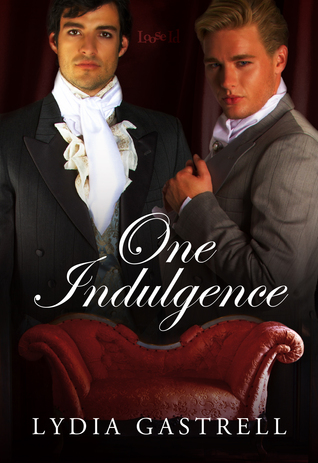
Author: Lydia Gastrell
Publisher: Loose Id
Pages/Word Count: 252 Pages
Rating: 4 Stars
Blurb: When Henry Cortland, the Earl of Brenleigh, comes to London to fulfill his duty and take a wife, he also decides to first fulfill his most secret and suppressed desires. He wants to spend just one night with a man. A sultry encounter with a handsome stranger surpasses all his hopes, leaving him certain that he will live off the memories for the rest of his life.
Lord Richard Avery has grown tired of his endless string of casual relationships, yet an argument with his lover sends him right into the arms of a total stranger. But Henry is not like any lover he has ever had, and the attraction between them is more than physical. Richard wants more, but can their mutual attraction overcome Henry’s family obligations and sense of duty? Can Richard convince him to follow his heart rather than the demands of family and title?
Review: Lydia Gastrell’s One Indulgence is a beautifully written gay Regency that’s also a great example of a classic Regency romance – gay, of course. That said, because it is very much a classic Regency, it hews closely – and rather too tightly – to the familiar, and sacrifices unpredictability and freshness for safety. But first things first…
What I love about Gastrell’s novel is how the writer not only shows her knowledge and passion for her chosen era, but also in the way she allows the story to unfold in a very leisurely, relaxed pace. This book is not for readers who want a lot of action (sexual and otherwise) and a lot of zippy dialogue that pings the four corners of the globe at a hundred miles a second. The book explores its heroes’ romance and travails in very much the same manner a period drama is often produced. We’re dealing with aristocrats here, as well, which means a lot of rigid social conventions that severely curtail behavior, so the energy levels are kept at a constant simmering point – only to explode when the moment’s ripe. Richard, being the more worldly of the pair, at least is street-smart enough to know where and how to deal with his frustrations and loneliness. Henry, being the quintessential bumpkin aristo, is forced to hold everything in and keep up a facade that slowly eats him up alive. He’s also alone, compared to Richard, who’s got a massive social circle to move around in.
The pair come together, separate, yearn, rail ineffectively, come together again, separate again, etc. – considering their social status and what’s at stake, none of the plot conflicts in the book are there as angst for angst’s sake. Richard’s troubles are real, as are Henry’s. Especially Henry’s. There’s a lot hinging on his forced marriage, and that’s got nothing to do with just his reputation. There are real people – poor ones, at that – who’re dependent on his fortune and the continuation of his line. He also suffers the most when growing up, being not only an only child, but also the son of a hateful bully. It’s no great wonder the adult Henry would behave in ways that’d exasperate the modern reader (confession: it took me a long while to warm up to him).
As can only be expected in gay lives pretty much crushed under the hypocrisy of the laws of the time, what I refer to as the “side effects” are depressing. No one can blame Sam Shaw, for instance, for turning out the way he did, and for him to tear Henry a new one felt cathartic to me despite my sympathies for Henry as well. There’s also the matter of Henry’s less wealthy cousin, who’s also a dependent. Relationships are destroyed, but while some remain irreparable, others, at least, can be salvaged. The final chapters of the book explore that very well and in a very emotional way, at that.
It’s because of these great touches that I still felt a bit let down while reading the book. Richard and Henry are excellent romance heroes, but I can’t help but think, “I’ve been down this road before.” It’s largely because they remain Regency tropes all the way to the end: the sexy, dominant aristocrat and the stammering, wide-eyed neophyte. And they never really rise above those, no matter what the circumstances, though perhaps the one detail that does in their relationship revolves around Richard’s handkerchief. It’s a sweet, sad, very subtle touch that reveals itself now and then, and it’s the kind of unpredictability that kept my interest up and made me wish for more of these unexpected little details. While it’s true both men do uncharacteristic things in the climactic scenes for that much-needed reversal in fortune, they don’t really exhibit much, if any, visible (personality) changes in the final chapter once all the smoke has cleared. They remain safely identifiable as the sexy, dominant aristocrat and the stammering, wide-eyed neophyte.
Even the side characters fall very neatly into frequently used molds. Culfrey’s the oldest of three siblings, and he’s a bully and a bigot. Richard’s the second, who refuses to marry and has been around the block a few times in defiance of his brother’s injunctions. Anne’s the youngest and only girl, the one whom everyone dotes on, the one who’s about to get married despite the fact that her heart’s elsewhere. She also smacks too much of Lydia Bennet – a touch ditzy and gullible, qualities that are, I suppose, made possible by her upbringing but are still too one-dimensional on the whole. She has friends – less moneyed ones who only show up as reminders of what she’s missing, and those scenes are, unfortunately, few.
The book keeps to Richard and Henry’s alternating POVs for two-thirds of the story. Then, rather surprisingly and somewhat frustratingly, a couple of random chapters focusing on two side characters’ POVs pop up. The one about Sam is really unnecessary and, in fact, is redundant. If all it does is give Henry an epic smackdown – and it does – that goal could’ve been achieved through Henry’s POV since he’s at the receiving end of things. Beyond that, the chapter does nothing but repeat what we already know about Sam’s relationship with both Richard and Henry. The other surprise chapter involves Anne, which was a POV I desperately wished were established from the beginning. Because we know exceedingly little about Anne and her true feelings and views about her forced marriage, suddenly being given that Anne-centric chapter so late in the book was like being fed a concentrated dose of a too-convenient resolution to the plot’s conflict. It also adds nothing substantial to Anne’s characterization, and she remains one-dimensional till the end.
Overall, though, I really enjoyed this book. If you’re thinking about testing gay Regency waters, I’d recommend One Indulgence as what I’d call a gateway novel for that particular sub-genre. It’s a lovely book despite some issues I had with it, and it sure bodes well for future titles coming our way from Ms. Gastrell.

You can buy One Indulgence here:





I downloaded One Indulgence from Amazon on my Kindle. This was a wonderful story. Great depth and characterization. I hope this author writes more! I love historical m/m romance.
LikeLiked by 1 person
There’s not much better than discovering a great book! Happy New Year, Laura! :)
LikeLike